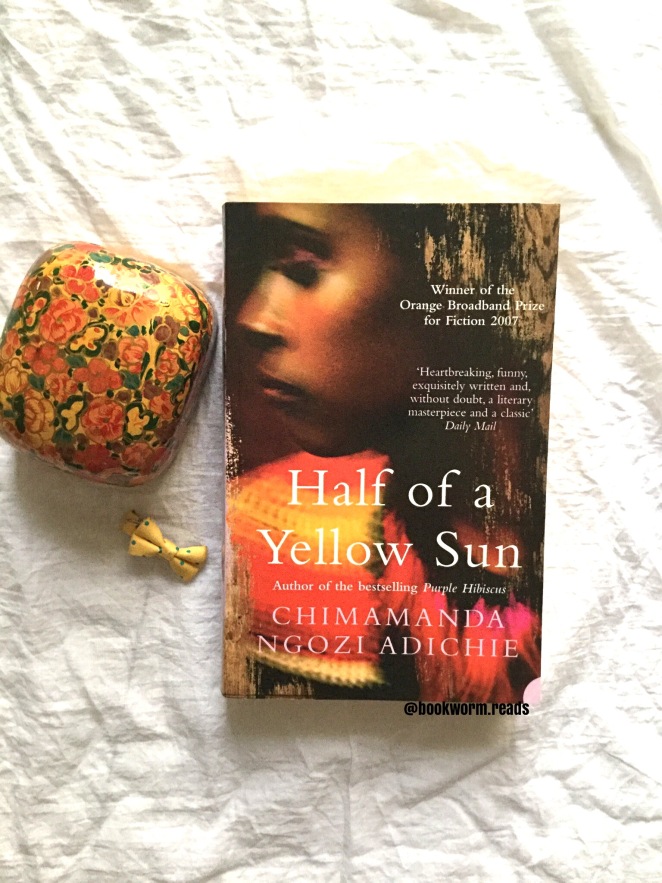Author: Chimamanda Ngozi Adichie
Publisher: Harper Perennial
Published: 2007
Language: English
Rating: 3.5/5
Blurb:
In 1960s Nigeria, a country blighted by civil war, three lives intersect. Ugwu, a boy from a poor village, works as a houseboy for a university lecturer, Olanna, a young woman, has abandoned her life of privilege in Lagos to live with her charismatic new lover, the professor. The third is Richard, a shy Englishman in thrall to Olanna’s enigmatic twin sister. When the shocking horror of the war engulfs them, their loyalties are severely tested as they are pulled apart and thrown together in ways that none of them imagined…

Review:
Reading Purple Hibiscus left me wanting more of Chimamanda’s descriptive writing, and so, I decided to reread Half of a Yellow Sun in a read-along. I had mixed feelings the first time I read it somewhat 4 years ago. I ventured out to see if my perspective altered and so once again I buckled up to take a tour of Nigeria.
The story explores the birth and death of the State of Biafra. Born on 30th May 1967 from Nigeria and finally annexed by the parent state in January 1970, it resulted in the death of millions in the war.
The plot was spun around five important characters and their lives during the civil unrest. Ugwu, the houseboy, was my favourite character of the lot. Chimamanda once again depicted the coming of age phase wonderfully in the book. His growing interest in reading and the newly found sexuality drew out some interesting anecdotes for the readers.
Olanna and Kaniene, the fraternal twins, hailing from a rich family were shown as polar opposites; one too subservient and the other too arrogant. Odenigbo, the politically driven air headed professor, who lived on alcohol and debated endlessly with his friends was a total lost case when faced adversity and reality. Lastly, Richard the Englishman, fascinated with Nigerian artefacts and struggling to pen down a book was the weakest character for me, didn’t help me at all in gliding along the plot.
Ashamed to admit, I knew nothing of the Biafra-Nigeria war before reading the book. Nigerian society divided on the basis of language, creed, and social class has a striking similarity to that of India. Adichie gave an eye-opening account of the conditions during the troubled times which was heart wrenching and touching. With Ugwu she covered the rural life and beliefs and Kaniene and her parents were a window to the lifestyle of the elite class. Dealing with themes of after-effects of colonization, regionalism you get a tale of people dealing with love, hatred, betrayal, and separation.
The structuring of the book by dividing it into the early 60s and late 60s had me confused at times when it jumped to and fro. Some unnecessary details, which added to the sheer length of the book, got me impatient by the time I got to the major events or plot twists. But I loved seeing the drastic improvement in her writing skills since her earlier work, the fluid, uncomplicated prose with the fragrance of Africa is a must experience for every hungry reader out there.
Buy your copy here
